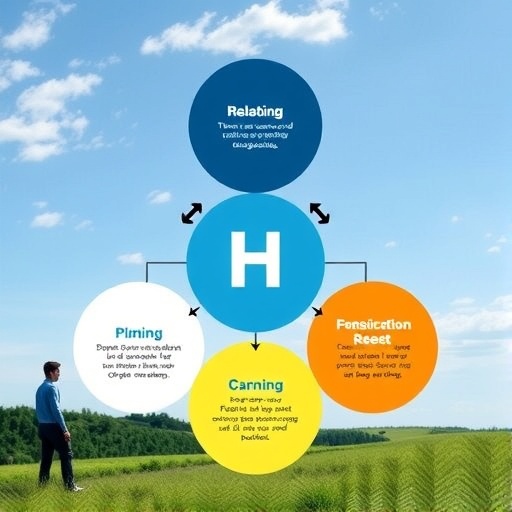Revolutionizing Organizational Behavior: Insights from the 5 H Psychological Framework
In a groundbreaking study published in Discovery Psychology, researchers N. Jaturat and K. Na-Nan have explored the validity of the 5 H psychological framework as a critical tool for fostering sustainable organizational behavior. As organizations around the globe face unprecedented challenges, the need for frameworks that encapsulate both psychological principles and sustainable practices has never been more urgent. This research delves into the intricacies of the 5 H framework, providing a comprehensive analysis that could pave the way for transformative changes in corporate settings.
The essence of the 5 H framework lies in its focus on five core components: Human, Harmony, Happiness, Health, and Hope. Each of these elements plays a significant role in shaping the culture within an organization. By examining how these components interrelate, the researchers aim to uncover the psychological underpinnings that drive organizational behavior towards sustainability. This approach offers a multifaceted perspective, challenging traditional models that often overlook the softer aspects of workforce dynamics.
According to Jaturat and Na-Nan, the Human aspect emphasizes the importance of recognizing individual contributions within a team. Empowering employees not only boosts morale but also enhances productivity. This principle underscores the need for organizational structures that prioritize human interaction and emotional intelligence as vital components of success. By nurturing talent and recognizing individual achievements, organizations can foster an environment conducive to sustainability.
Harmony refers to the collaborative spirit that should exist within a workplace. The study suggests that a harmonious environment enhances cooperation among team members and across organizational departments. This synergy is crucial in promoting innovative thinking, as it allows for diverse ideas to merge. The findings imply that cultivating harmony within teams can lead to stronger commitment to organizational goals, including sustainability initiatives.
Furthermore, the researchers highlight the role of Happiness as a fundamental element of the framework. Employees who experience higher levels of happiness are more engaged and motivated, which ultimately translates into better organizational performance. The study presents compelling evidence that supports the notion that happiness is not merely a byproduct of success but a vital catalyst for it. Organizations that invest in employee well-being are likely to see a direct impact on their sustainability efforts.
Health is another critical component of the 5 H framework. Mental and physical health among employees is paramount for maintaining high levels of productivity and creativity. The research draws attention to the necessity of promoting health initiatives within organizations. By creating programs that support the well-being of individuals, companies can enhance their overall effectiveness while fostering a culture that values sustainable practices. Healthy employees are more equipped to contribute meaningfully to sustainability goals.
Hope stands as the fifth pillar of this framework and serves as a motivational force that drives individuals and organizations alike. The study articulates that fostering a sense of hope among employees can significantly influence their commitment to both personal and organizational objectives. In a world where uncertainty often prevails, instilling hope becomes essential in guiding teams through challenges. This optimism fosters resilience, a key trait necessary for sustainable practices.
The researchers utilized a mixed-methods approach to validate the 5 H framework. This included qualitative interviews and quantitative surveys across various sectors. By gathering data from a diverse range of organizations, the validity of the framework was rigorously tested. The findings suggest that organizations that embrace and implement the principles of the 5 H framework are more likely to succeed in their sustainability initiatives.
Moreover, the study provides a practical roadmap for organizations looking to adopt this framework. Recommendations include training programs focused on emotional intelligence, team-building activities aimed at enhancing harmony, and wellness programs that address employee health. These actionable steps are designed to encourage a cultural shift towards sustainability, making the research not only theoretical but also pragmatic.
The implications of adopting the 5 H framework extend beyond individual organizations. As companies commit to sustainable practices, they contribute to larger societal goals, positioning themselves as leaders in corporate social responsibility. This ripple effect has the potential to inspire other organizations to embrace similar frameworks, creating a collective movement towards sustainability in the corporate world.
As organizations continue to navigate the complexities of modern business, understanding the psychological factors that underpin behavior is crucial. The 5 H framework offers a fresh perspective that integrates psychological well-being with sustainable practices. Jaturat and Na-Nan’s research serves as a clarion call for organizations to rethink their strategies, emphasizing the importance of psychological health in any sustainability agenda.
In conclusion, the validation of the 5 H psychological framework for sustainable organizational behavior marks a significant advancement in the field of organizational psychology. By highlighting the interconnectedness of human aspects, harmony, happiness, health, and hope, this framework provides a robust foundation for organizations striving to achieve sustainability goals. The study not only sheds light on the critical role of psychological principles in fostering organizational behavior but also sets the stage for future research and practical applications.
In a rapidly changing world, the insights gained from this research could serve as a beacon for organizations seeking to align their operations with the principles of sustainability. As more companies embrace these principles, the potential for creating a more sustainable future becomes increasingly attainable. The 5 H framework, therefore, represents a critical step forward in understanding and improving organizational behavior in the quest for sustainability, assisting organizations to thrive in harmony with their environments.
Subject of Research: The 5 H Psychological Framework for Sustainable Organizational Behavior
Article Title: Validating the 5 H Psychological Framework for Sustainable Organizational Behavior
Article References:
Jaturat, N., Na-Nan, K. Validating the 5 H psychological framework for sustainable organizational behavior.
Discov Psychol 5, 163 (2025). https://doi.org/10.1007/s44202-025-00534-1
Image Credits: AI Generated
DOI: https://doi.org/10.1007/s44202-025-00534-1
Keywords: Psychological Framework, Sustainability, Organizational Behavior, Employee Well-being, Corporate Responsibility




